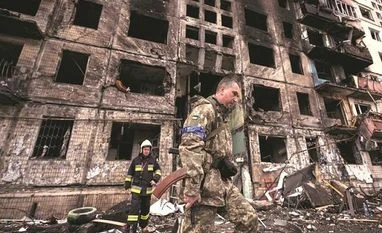Ukrainian authorities were investigating possible war crimes by Russia after finding hundreds of bodies, some bound and shot at close range, strewn around towns near Kyiv after Kremlin forces withdrew to refocus their attacks in other parts of the country.
In the town of Bucha, 37 km (23 miles) northwest of Kyiv's city centre, Reuters reporters saw a man lay sprawled by the roadside, his hands tied behind his back and a bullet wound to his head.
Bucha's deputy mayor, Taras Shapravskyi, said 50 of some 300 bodies, found after Russian forces withdrew from the city late last week, were the victims of extra-judicial killings carried out by Russian troops.
Reuters could not independently verify those figures or who was responsible for the killings.
Russia's defence ministry said in a statement issued on Sunday that all photographs and videos published by the Ukrainian authorities alleging "crimes" by Russian troops in Bucha were a "provocation," and no resident of Bucha suffered violence at the hands of Russian troops.
Satellite images showed a 45-foot-long trench dug into the grounds of a Ukrainian church where a mass grave was found this week. Reuters reporters in Bucha visited a mass grave at one church that was still open, with hands and feet poking through the red clay heaped on top.
Pictures of the destruction and apparent violence towards civilians sparked widespread condemnation of Russia and leader Vladimir Putin. U.S. Secretary of State Antony Blinken described the images as "a punch in the gut," while United Nations Secretary-General Antonio Guterres called for an independent investigation.
"Putin and his supporters will feel the consequences," said German Chancellor Olaf Scholz, adding that Western allies would agree on further sanctions in the coming days.
Germany's Defence Minister Christine Lambrecht said the European Union must discuss banning the import of Russian gas - a departure from Berlin's prior resistance to the idea of an embargo on Russian energy imports.
Russia requested the U.N. Security Council convene on Monday to discuss what Moscow called a "provocation by Ukrainian radicals" in Bucha.
Russia has previously denied targeting civilians and has rejected allegations of war crimes in what it calls a "special military operation" aimed at demilitarising and "denazifying" Ukraine. Ukraine says it was invaded without provocation.
Human Rights Watch said it had documented "several cases of Russian military forces committing laws-of-war violations" in the Ukrainian regions of Chernihiv, Kharkiv and Kyiv.
Ukraine's foreign minister called on the International Criminal Court to collect evidence of what he called Russian war crimes. The foreign ministers of France and Britain said their countries would support any such probe.
However, legal experts say a prosecution of Putin or other Russian leaders would face high hurdles and could take years.
Widespread fighting
Russia has pulled back forces that had threatened Kyiv from the north, saying it intends to focus on eastern Ukraine.
Explosions were heard in the early hours of Monday in the cities of Kherson and Odesa, in the south, while air raid sirens sounded across the country's east.
Missiles struck near Odesa on Sunday, with Russia saying it had destroyed an oil refinery used by the Ukrainian military.
The Odesa city council said "critical infrastructure facilities" were hit.
The governor of the eastern Donetsk region said on Sunday shelling had continued throughout the night and day. Russian shelling killed seven people in Kharkiv, Ukraine's second-largest city, according to the regional prosecutor's office.
Ukraine evacuated more than 2,600 people from the southeastern port of Mariupol and the region of Luhansk on Sunday, Ukrainian Deputy Prime Minister Iryna Vereshchuk said.
Ukrainian officials were in talks with Russia to allow several Red Cross buses to enter Mariupol, she added.
The Red Cross abandoned earlier attempts due to security concerns. Russia blamed the charity for the delays.
Mariupol is Russia's main target in Ukraine's southeastern region of Donbas, and tens of thousands of civilians there have been trapped for weeks with scant access to food and water.
There was little sign of a breakthrough in efforts to negotiate an end to the war, although Russia's chief negotiator, Vladimir Medinsky, said talks were due to resume on Monday via videoconference.
(Additional reporting by Zohra Bensemra and Abdelaziz Boumzar in Bucha, Pavel Polityuk in Lviv, Issam Abdallah in Odesa, Natalia Zinets in Mukachevo, Lidia Kelly in Melbourne and Reuters bureaus in Europe and Washington
Writing by Andy Sullivan and Lincoln Feast Editing by Michael Perry)
Unlock 30+ premium stories daily hand-picked by our editors, across devices on browser and app.
Pick your 5 favourite companies, get a daily email with all news updates on them.
Full access to our intuitive epaper - clip, save, share articles from any device; newspaper archives from 2006.
Preferential invites to Business Standard events.
Curated newsletters on markets, personal finance, policy & politics, start-ups, technology, and more.
)